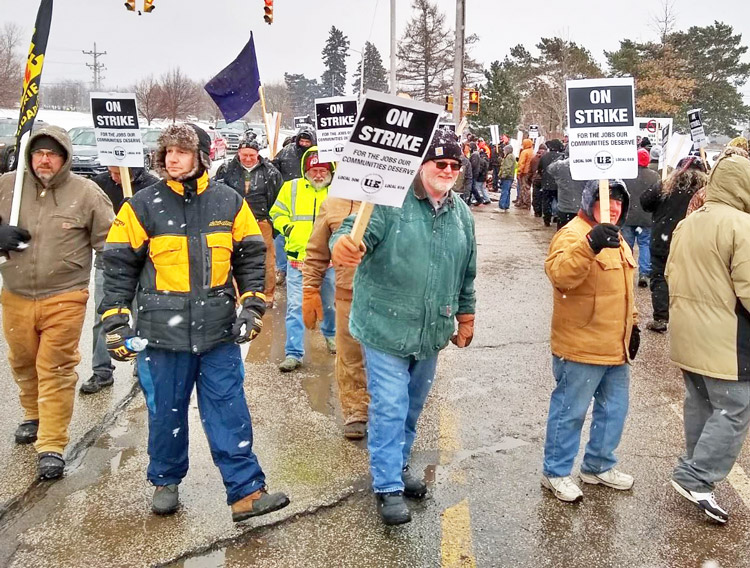ERIE, Pa. — A nine-day strike at the former GE Transportation plant here ended March 6 after a 90-day deal was reached to hold contract negotiations. Bosses at Wabtec — Westinghouse Air Brake Technologies Corp. — which took over GE Transportation Feb. 25 slashed wages for new hires and returning laid-off workers by 38 percent. It also said it would contract workers for up to 20 percent of the jobs, require forced overtime and other attacks. Locals 506 and 618 of the United Electrical Workers union, which represent the 1,700 workers at the factory, set up picket lines.
“This is a real education,” striker Mike Sadler told me on the picket line before the deal was struck. “I’ve walked by burn barrels when workers were on strike before, not thinking what was going on, now I know what it means.”
Under the terms of the deal, the union agrees not to strike and Wabtec agrees there will be no permanent layoff or plant closure for the next 90 days. The bosses will maintain wage rates for existing Wabtec employees, forswear forced overtime and freeze hiring over this time period so the question of a divisive two-tier wage isn’t posed. Negotiations will take place with participation of a federal mediator.
The UE locals walked out to preserve wages and working conditions won in struggle over 70 years. Gains made there helped create jobs and improve conditions in area plants, and the strike won broad support from workers.
Other workers and small shopkeepers in the area brought food, wood for burn barrels and other supplies to the picket lines in solidarity with the strikers.
This correspondent works at Walmart, after having worked at Hyundai in Philadelphia building rail cars and many other industrial jobs. When I showed up on the picket line with a sign that said, “Walmart workers support UE strikers!” I received a warm welcome.
“The boss and media paint us as greedy and selfish,” striker Sam Hill said when he asked me to take a picture. “But we’re on strike against mandatory overtime when so many of our brothers and sisters are laid off. It’s more profitable for bosses to work us overtime — they’re the greedy ones — rather than hire another worker with benefits.
“We’re fighting for the next generation, we don’t want the two-tier,” he said. “And when you organize at Walmart, we’ll be there for you.”
This is the kind of solidarity we all need.
This correspondent and other Socialist Workers Party members who came to show support for the fight went door to door here and in nearby towns. There were varied opinions on the walkout.
“Who makes $35 an hour these days? Why aren’t they satisfied?” asked Amanda Orsefski. I responded that the workers didn’t walk out to get more money, but so others who got hired wouldn’t work for less, which would drag us all down. I told her that at Walmart, they cut a lot of workers’ hours after giving a pay raise.
“I shop at Walmart, but I didn’t know that,” she said. “They shouldn’t cut your hours. It’s hard enough to get by.”
When we knocked on Adam Rekitt’s door March 8, he told us. “I started talking to my co-workers about getting our union, the Service Employees International Union, to get a group of us to go down to the picket line to show our support, but then the next day the strike ended.”
We told Rekitt that many workers we met supported the strike, but some said that they didn’t understand why they were striking when they make so much money.
“They’re not just fighting for themselves, they’re fighting for future generations,” Rekitt said.
Things have changed for workers, he said. “My parents and my wife’s parents had big families, more than 10 kids with just our fathers working. Now we have three kids and we’re struggling to make ends meet,” he said. “My wife works as a manager in a fast food restaurant and I have a relatively good job working in a government office, but we’re just getting by.”
“How do we turn this around and get people to join the unions?” he asked.
“Workers need to see that the union is fighting,” said Seth Galinsky, SWP candidate for New York City Public Advocate, who came to show support for the UE workers. “Over the last several decades union officials have been more interested in trying to keep up their dues base, and not organizing a real fight against the bosses. And they tie the unions to supporting one or another capitalist candidate, usually from the Democratic Party.”
“Workers have to see ourselves as the union,” he said. “And rely on our own strength in numbers.”
Rekitt said that he’s interested in socialism, “but aren’t there always going to be some people that want to be on top?”
I pointed to the example of Cuba, where workers and farmers made a revolution in 1959 and took power into their own hands. They nationalized the land to guarantee that no working farmer could lose their livelihood. They organized a mass literacy campaign so all workers and farmers could participate equally in running the country.
“What you say about what they did in Cuba makes some sense to me,” Rekitt said. “I’d like to learn more about the revolution there.”
He got a subscription to the Militant, and The Clintons’ Anti-Working-Class Record, In Defense of the US Working Class, and “It’s the Poor Who Face the Savagery of the US ‘Justice’ System.”


